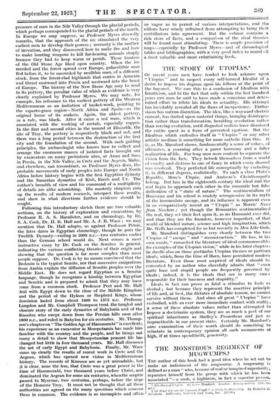THE STORY OF UTOPIAS.*
Or recent years men have tended to look askance upon " Utopias " and to suspect every self-termed Idealist of a desire to impose his dogmas upon his fellows at the point of the bayonet. We owe this to a confusion of Idealism with fanaticism, and to the fact that only within the last hundred years can man be said to have made a conscious and deter- mined effort to relate his ideals to actuality. His attempt has inevitably revealed all the flaws of inexperience. Enthu- siasm has outrun discretion. The idea, like a wayward electric current, has darted upon material things, bringing disintegra- tion rather than transformation, heralding revolution rather than serving evolution, until disgusted realists have dismissed the entire quest as a form of perverted egotism. But the Idealism which embodies itself in " Utopias " or any other artistic medium is something far more catholic than this. It is, as Mr. Mumford shows, fundamentally a sense of values, of ultimates, a yearning after a purer harmony and a fuller realization of life. For long men were content to separate the vision from the fact. They betook themselves from a world of cruelty and distress to one of fancy in which every discord was resolved. They perfected life conceptually by excluding it, in different degrees, realistically. To such a class Plato's Republic, More's Utopia, and Andreae's Christianopoli.s belong. But late in the eighteenth century the ideal and the real begin to approach each other in the romantic but false deification of a " state of nature." The sentimentalism of Rousseau and his school is crudely retrogressive in its myth of the immaculate savage, and its influence is apparent even in so comparatively recent an " Utopia " as Morris' News from Nowhere ; yet though the Romantics sentimentalized the real, they set their feet upon it, as no Humanist ever did, and thus they are the founders, however imperfect, of that world of blended nature, science and high imagination, which Mr. Wells has completed for us but recently in Men Like Gods.
Mr. Mumford distinguishes very clearly between the two Utopias of " escape " and " reconstruction." He has, in his own words, " ransacked the literature of ideal commonwealths for examples of the Utopian vision," while in his later chapters he dwells also on those particular Utopian themes or partisan ideals, which, from the time of Marx, have percolated modern literature. Even those most sceptical of ideals should be converted by an author who cheerfully admits that " even quite base and stupid people are frequently governed by ideals ; indeed, it is the ideals that are in many cases responsible for their baseness and stupidity."
Ideals in fact can prove as fatal a stimulus to fools as alcohol ; but because they represent the assertive principle of life and, at best, the dictates of absolute reason, we cannot survive without them. And since all great " Utopias " have embodied, with an ever more immediate contact with reality, a sense of these absolute values rather than attempted to Impose a doctrinaire system, they are as much a part of our spiritual inheritance as Shelley's Prometheus and just as impracticable in our present state. Certainly Mr. Mumford's sane examination of their worth should do something to reinstate in contemporary opinion all such monuments of high, if at times spendthrift, generosity.






































 Previous page
Previous page